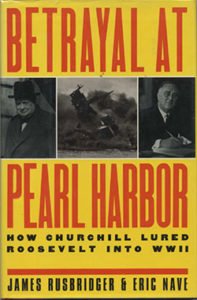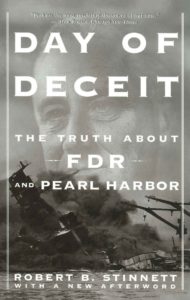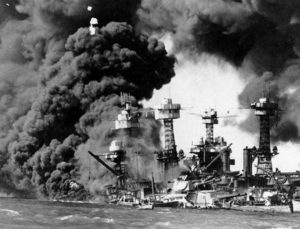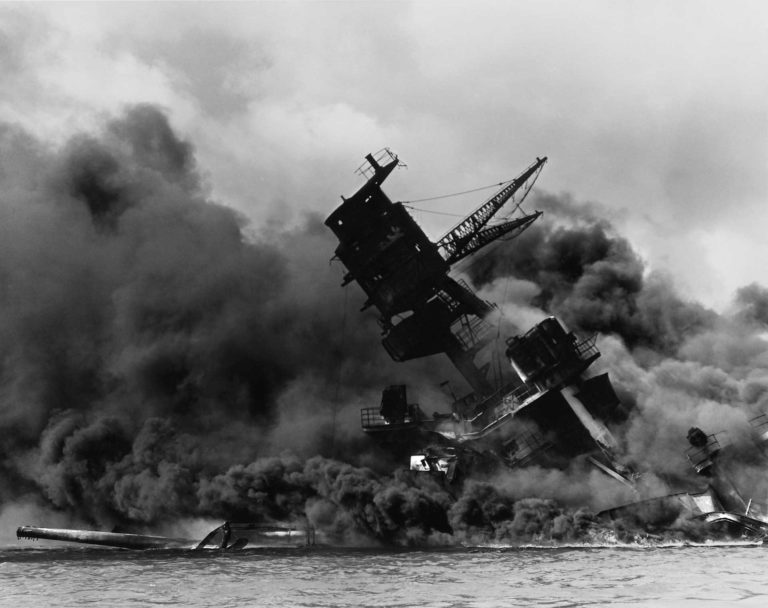Deceit at Pearl Harbor
In December 1941 Japanese aircraft attacked Pearl Harbor, Hawaii, killing over 2400 American citizens and sinking nearly twenty warships. It was viewed as a master strike by the Japanese, who at that time ruled supreme in the Sea and had a reach that extended far beyond the borders of the relatively small island. The result of the surprise attack on Pearl Harbor was that the American people were now emboldened to take part in the war against Hitler. Before the strike, only half of the nation was supportive of an attack against the Axis powers.
Pearl Harbor: Branches

There are two branches to the theory that Japan was allowed to attack Pearl Harbor so that America could assist the Allies against Germany. The first is that the British Prime Minister Winston Churchill knew about the assault in advance and told Roosevelt, but they both agreed to sit on the information, obviously having some sort of arrangement. The second theory is more prominent, in that Churchill knew of the attack but did not tell Roosevelt. The second limb of this theory was initially endorsed in the book “Betrayal at Pearl Harbor”. The book was written by James Rusbridger and Eric Nave in 1991. Nave had in fact broken the Japanese naval cipher in 1939 and Rusbridger was a former M16 intelligence officer. The backgrounds of these two co-authors gave the book much publicity and credence. The central claim of “Betrayal at Pearl Harbor” was that Britain had broken the Japanese codes and knew of the attack in advance.
A recently published declassified Naval memo stated that:
“In anticipation of possible open conflict with this country, Japan is vigorously utilizing every available agency to secure military, naval and commercial information, paying particular attention to the West Coast, the Panama Canal and the Territory of Hawaii”
It also said that the Japan Naval Inspectors Office was
“primarily interested in obtaining detailed technical information which could be used to advantage by the Japanese Navy.”
This Naval Intelligence Memo was dated Dec 4, 1941. While this is quite damning evidence to the Pearl Harbor conspiracy, it is nowhere near concrete. Reports such as this might have been filtering in all the time, and it was unlikely that Japan would make a trip so far from their homeland and refuel before hitting Pearl Harbor. And the information does not give any specific strategic information such as time or location. The only thing that could be done was to put the whole West Coast on alert from “some” sort of attack, and all they knew was that Japan was gathering intelligence for some reason. Thus while theorists might state that this memo is proof that Roosevelt knew about the attack on Pearl Harbor, it represents no more than one of possibly hundreds of similar documents indicating some threat, at some location, at some time.

Another theory is that not only was Roosevelt aware of the attack, but actively had a hand in orchestrating it. He was known to have been sympathetic to the Allies but could not intervene because it would have gone against public sentiment to engage in a European war. Roosevelt was frequently quoted as saying that he would never put American soldiers into “foreign wars”. Tyler Kent, a code clerk in the US embassy in London, was alleged to have discovered secret dispatches between Roosevelt and Churchill which revealed that Roosevelt wanted to win the war along with England. Kent spent the majority of the war in jail after being caught trying to smuggle documents out of the embassy. Theorists also hold that America had done it’s best under Roosevelt to try to provoke Germany into a war, by freezing German assets, shipping destroyers, and U-boats to Britain. World War II Veteran Robert B. Stinnett has published a book titled “Day of Deceit: The Truth bout FDR and Pearl Harbor(2000)”, which further investigates the role that Roosevelt apparently had in entering World War II via Japan. America treated Japan much as it did Germany, freezing its assets and closing the Panama Canal. Japan was known at that time to have been quite belligerent in any case and quite easy to provoke. Admiral J.O. Richardson did fly to Washington to protest the decision to station the naval base in Pearl Harbor, which was quite deemed indefensible for a variety of reasons, including that it was vulnerable in any direction, could not be effectively rigged with nets and lacked adequate fuel supplies and dry docks. He came away from the exchange with FDR and stated:
“I came away with the impression that, despite his spoken word, the President was fully determined to put the United States into the war if Great Britain could hold out until he was reelected”
Pulitzer Prize winner John Toland has also provided evidence about advance knowledge of Pearl Harbour by Washington in his book “Infamy: Pearl Harbor and Its Aftermath”.

The conclusion is that it is, in fact, possible that Churchill was aware of the invasion in advance and opted not to tell Roosevelt about it. We have good reasons as to why this intelligence would not be given, at a time when England stood to lose the war which would have shaped the future of world affairs to this day. The decision could have come down to a couple of thousand of American troops at Pearl Harbor or millions of English citizens. And we also have two highly authoritative whistleblowers. This is as much proof as you are going to get in the land of conspiracy theories, as no mainstream papers are going to report international treachery of this level. Some could even say it’s simply good business to not inform America, and not in the interests of the British Empire at the time. However, Churchill could have simply given the information to Roosevelt in good faith, and it could have been spun in order to get the American people to take part in the campaign against Germany. The theory that Roosevelt knew about and helped the attack on Pearl Harbor is far less likely, though there have been multiple credible testimonies that Washington knew about the attack in advance.
Documentaries and Related Videos
1. Pearl Harbor & F.D.R. Conspiracy
https://www.youtube.com/watch?v=qR8Oe3mDF0s
2. Conspiracy Theory: Pearl Harbor
https://www.youtube.com/watch?v=8dkjspnFdxY


